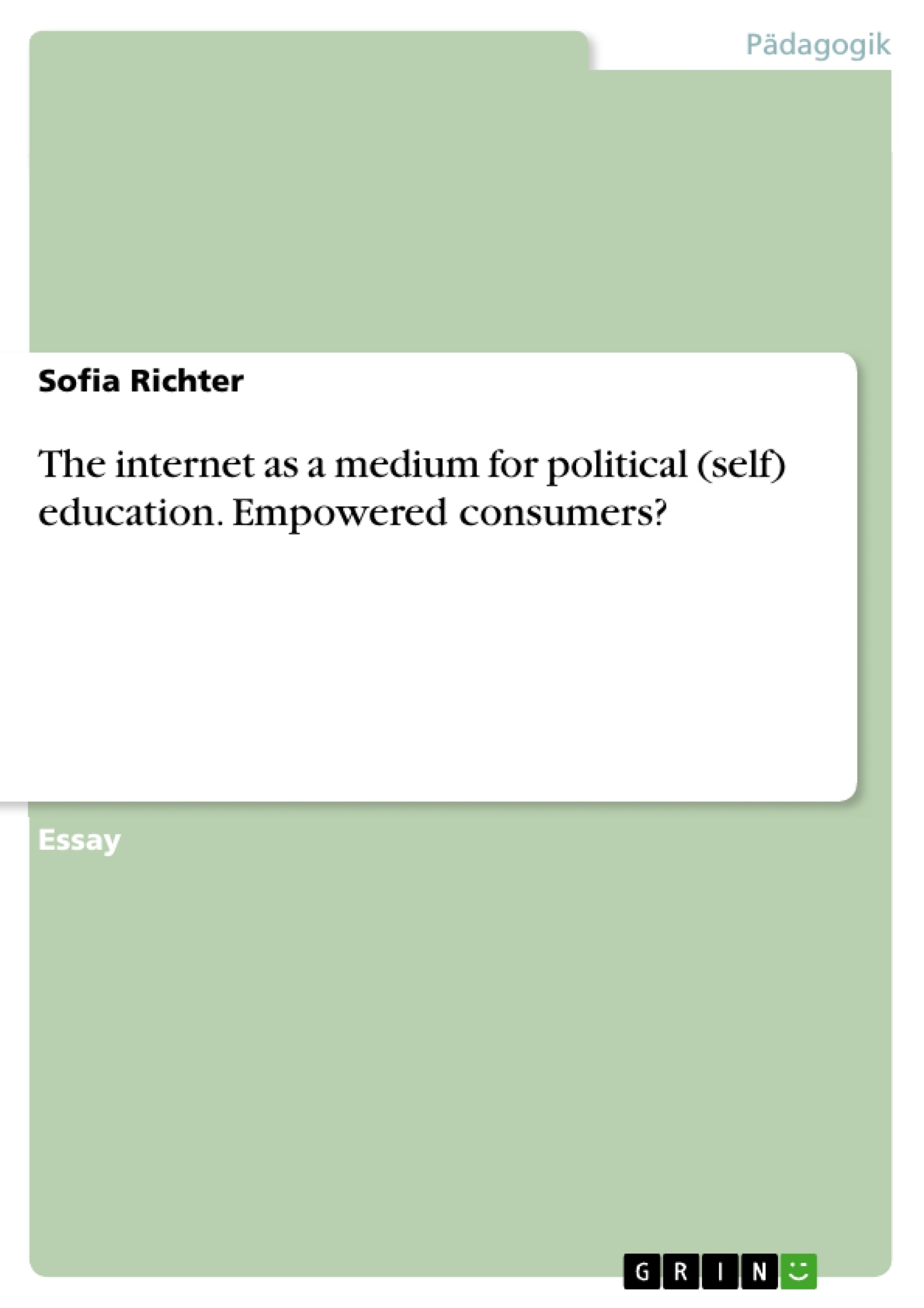In this essay it will be argued that, the mass of information the internet inflicts, is not only overwhelming to consumers, but is hereby presenting a threat to democracy, as it is used for deliberate manipulation. Consumers seem to lack emancipation tools and apparently need to be accordingly educated. This means that education needs to provide consumer’s empowerment tools, in order for consumers to think critically and continue to participate as active citizens of a democracy.
Mass media confronts us with an immense amount of information. It opens up a new dimension for information to be distributed and noticed. Online information travels with a much greater velocity and range than information ever has before. It is reproduced on various channels and platforms. One might argue that the mass of information hereby accessible to consumers is empowering; effortlessly providing them with information upon which they can make their own choices. Looking at cases like the Cambridge Analytica-Facebook Scandal, and its consequences for the US presidential election of 2016 it is evident that online information is biased instead, and serves manipulation purposes, contributing greatly to political events.
Inhaltsverzeichnis
- The Internet as a source for political information
- About the term "Fake news" and its presence in our contemporary society
- A new dimension taken up for and by fake news
Zielsetzung und Themenschwerpunkte
Dieser Essay befasst sich mit dem Einfluss des Internets auf die politische (Selbst-)Bildung und untersucht, inwiefern die Fülle an online verfügbaren Informationen die Bürger zu mündigen Konsumenten macht.
- Der Einfluss des Internets als Medium für politische Information
- Die Herausforderungen durch "Fake News" und die Entstehung einer "Post-Truth-Gesellschaft"
- Die Bedeutung politischer Bildung zur Förderung kritischer Medienkompetenz
- Die Rolle von Social Media in der Verbreitung politischer Botschaften
- Die Manipulationspotenziale im digitalen Raum und ihre Auswirkungen auf die Demokratie
Zusammenfassung der Kapitel
The Internet as a source for political information
Das Kapitel beleuchtet die wachsende Bedeutung des Internets als Informationsquelle für politische Inhalte. Es wird dargelegt, dass Online-Quellen, wie Blogs, in der Wahrnehmung der Nutzer einen vergleichbaren Stellenwert mit journalistischen Medien einnehmen. Die Studie analysiert den Einfluss von Facebook-Posts auf politische Entscheidungen und die zunehmende Nutzung sozialer Netzwerke durch Politiker für Wahlkampfzwecke. Es wird argumentiert, dass die einfache Zugänglichkeit des Internets zu einer stärkeren Partizipation in der Demokratie beitragen kann. Allerdings wird gleichzeitig die Frage nach der Glaubwürdigkeit und Relevanz von online verbreiteten Informationen aufgeworfen.
About the term "Fake News" and its presence in our contemporary society
Dieses Kapitel beleuchtet den Begriff "Fake News" und seine Bedeutung in der heutigen Gesellschaft. Es wird die Entwicklung und Verbreitung des Begriffs nach der US-Präsidentschaftswahl 2016 erläutert. Es werden historische Beispiele für bewusste Fehlinformationen, wie die "Donation of Constantine" und "Der Stürmer", aufgezeigt. Der Essay verweist auf die lange Tradition von Propaganda und stellt die Frage, inwieweit die aktuelle Verbreitung von Fake News als neue Norm akzeptiert werden kann.
A new dimension taken up for and by fake news
Im letzten Kapitel wird die besondere Reichweite und Geschwindigkeit der Verbreitung von Fake News im Internet im Vergleich zu traditionellen Medien hervorgehoben. Es werden Beispiele für Fake News aus dem US-Wahlkampf 2016, wie die "Pizzagate" Story, genannt.
Schlüsselwörter
Politische (Selbst-)Bildung, Internet, Fake News, Post-Truth-Gesellschaft, Manipulation, Propaganda, Medienkompetenz, Demokratie, Citizen Empowerment, Social Media.
Häufig gestellte Fragen
Wie beeinflusst das Internet die politische Bildung?
Das Internet bietet eine enorme Informationsfülle, birgt aber auch Gefahren durch Manipulation und die schnelle Verbreitung ungeprüfter Nachrichten.
Was versteht man unter einer "Post-Truth-Gesellschaft"?
Es beschreibt einen Zustand, in dem emotionale Appelle und persönliche Überzeugungen mehr Einfluss auf die öffentliche Meinung haben als objektive Fakten.
Warum sind "Fake News" eine Bedrohung für die Demokratie?
Sie können Wählerentscheidungen manipulieren, wie im Fall des Cambridge-Analytica-Skandals, und das Vertrauen in demokratische Institutionen untergraben.
Welche Rolle spielt Medienkompetenz in diesem Essay?
Medienkompetenz wird als essentielles Werkzeug zur "Empowerment" der Bürger angesehen, damit diese Informationen kritisch hinterfragen können.
Gab es Fake News schon vor dem Internetzeitalter?
Ja, der Essay nennt historische Beispiele wie die "Konstantinische Schenkung" oder die Propaganda im "Stürmer" als Vorläufer gezielter Desinformation.
- Quote paper
- Sofia Richter (Author), The internet as a medium for political (self) education. Empowered consumers?, Munich, GRIN Verlag, https://www.grin.com/document/1273847



